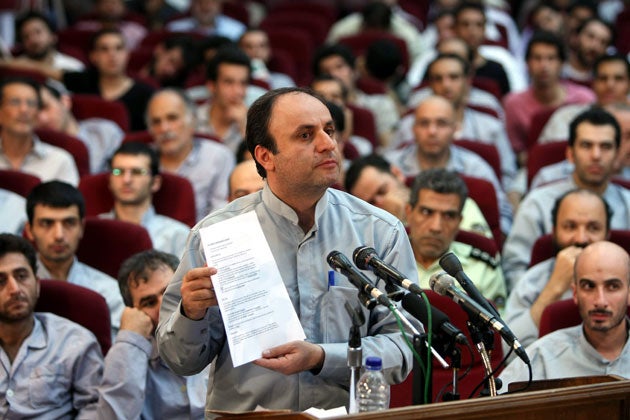Miliband's fury as Iranian embassy worker is charged with spying
Appearance of senior staff member in a mass trial in Tehran is condemned as 'an outrage'

Your support helps us to tell the story
From reproductive rights to climate change to Big Tech, The Independent is on the ground when the story is developing. Whether it's investigating the financials of Elon Musk's pro-Trump PAC or producing our latest documentary, 'The A Word', which shines a light on the American women fighting for reproductive rights, we know how important it is to parse out the facts from the messaging.
At such a critical moment in US history, we need reporters on the ground. Your donation allows us to keep sending journalists to speak to both sides of the story.
The Independent is trusted by Americans across the entire political spectrum. And unlike many other quality news outlets, we choose not to lock Americans out of our reporting and analysis with paywalls. We believe quality journalism should be available to everyone, paid for by those who can afford it.
Your support makes all the difference.The Foreign Office reacted with fury last night after a senior worker at the British embassy in Iran was charged with spying.
It condemned as an "outrage" the appearance in court of Hossein Rassam among dozens of accused at a mass trial that began yesterday morning .
Mr Rassam was one of nine British embassy staff arrested in the wake of the massive anti-government protests that followed Iran's disputed presidential election in June.
"This is completely unacceptable and directly contradicts assurances we had been given repeatedly by senior Iranian officials," a Foreign Office spokeswoman said. "We deplore these trials and the so-called confessions of prisoners who have been denied their basic human rights."
The Foreign Secretary, David Miliband, added last night that he was "deeply concerned by the unjustified charges. Hossein is a member of our embassy staff going about his legitimate duties. Iranian action against him only brings further discredit on the Iranian regime."
At least 26 were killed and hundreds arrested in the post-election violence, blamed by the Iranian authorities on Western interference. Moderates say the poll was rigged for President Mahmoud Ahmadinejad to win.
Mr Rassam, the British embassy's chief political analyst and most senior Iranian worker, is charged with espionage and is said to have confessed to handing information about the demonstrations to Washington.
The rambling indictment charges him with espionage, inciting riots and acting against national security, before pointing a finger at Western organisations including the Israeli secret service Mossad, Facebook, Twitter, BBC Persia, Voice of America and Google, which has released new Persian-English translation software.
According to the state-run Islamic Republic News Agency (IRNA), Mr Rassam had said in his confession: "The local staff were asked by their superiors at the British embassy to attend the riots. Several British diplomats attended rallies. The British ambassador and the chargé d'affaires also went to a rally."
Mr Rassam, the only one of the nine to be charged, was released from jail on £60,000 bail in July. He is one of dozens accused of aiding a plot by the Western powers – especially America and Britain – to overthrow Iran's system of clerical rule.
Foreign journalists were barred from the courtroom yesterday, but according to IRNA, a prosecutor told the court that America and Britain were bent on a "soft overthrow" of the Iranian government.
Embassy staff were ordered to be present at the riots, Mr Rassam is said to have told the court, as well as two diplomats named as Tom Burn and Paul Blemey. The Foreign Office would not confirm those were the names of diplomats expelled by Iran last month.
According to IRNA, Mr Rassam, an Iranian national, told the court that a £300,000 budget had been allocated for establishing contacts with political groups ahead of the election, including Mir Hossein Mousavi, the reformist opposition candidate who claims he was robbed of victory.
"My main responsibility was to gather information from Tehran and other cities by setting up contacts with individuals and influential parties and political groups and to send reports to London," he was quoted as saying.
"The British embassy, due to its hostile policies in Iran and fear of exposure of its contacts inside Iran, employed local staff to establish such contacts. I established such contacts based on orders from embassy officials."
The court also charged a French citizen, Clotilde Reiss, 23, and a worker at the French embassy with spying.
Mr Ahmadinejad was sworn in as President on Wednesday in a ceremony boycotted by reformist leaders and parliamentarians. The protests have plunged Iran into its biggest internal crisis in 30 years.
The trial was a further sign, said analysts, that Iran's hardline leadership was not interested in reconciliation with the moderate opposition or repairing ties with the West.
"This is not calculated to heal the divide," said Ali Ansari, an Iran expert at St Andrews University. "It's an attempt by hardliners to impose their narrative. You can't kill that many people on the street and not try to prove you were right. But the problems facing the Islamic Republic are far more serious than can be solved by simply putting on a show trial."
Yesterday's trial was the second one designed undermine the moderate opposition. At a mass trial last Saturday, more than 100 reformists, including a former vice-president and several other prominent figures, were charged with offences that included acting against national security by fomenting post-election unrest.
Join our commenting forum
Join thought-provoking conversations, follow other Independent readers and see their replies
Comments